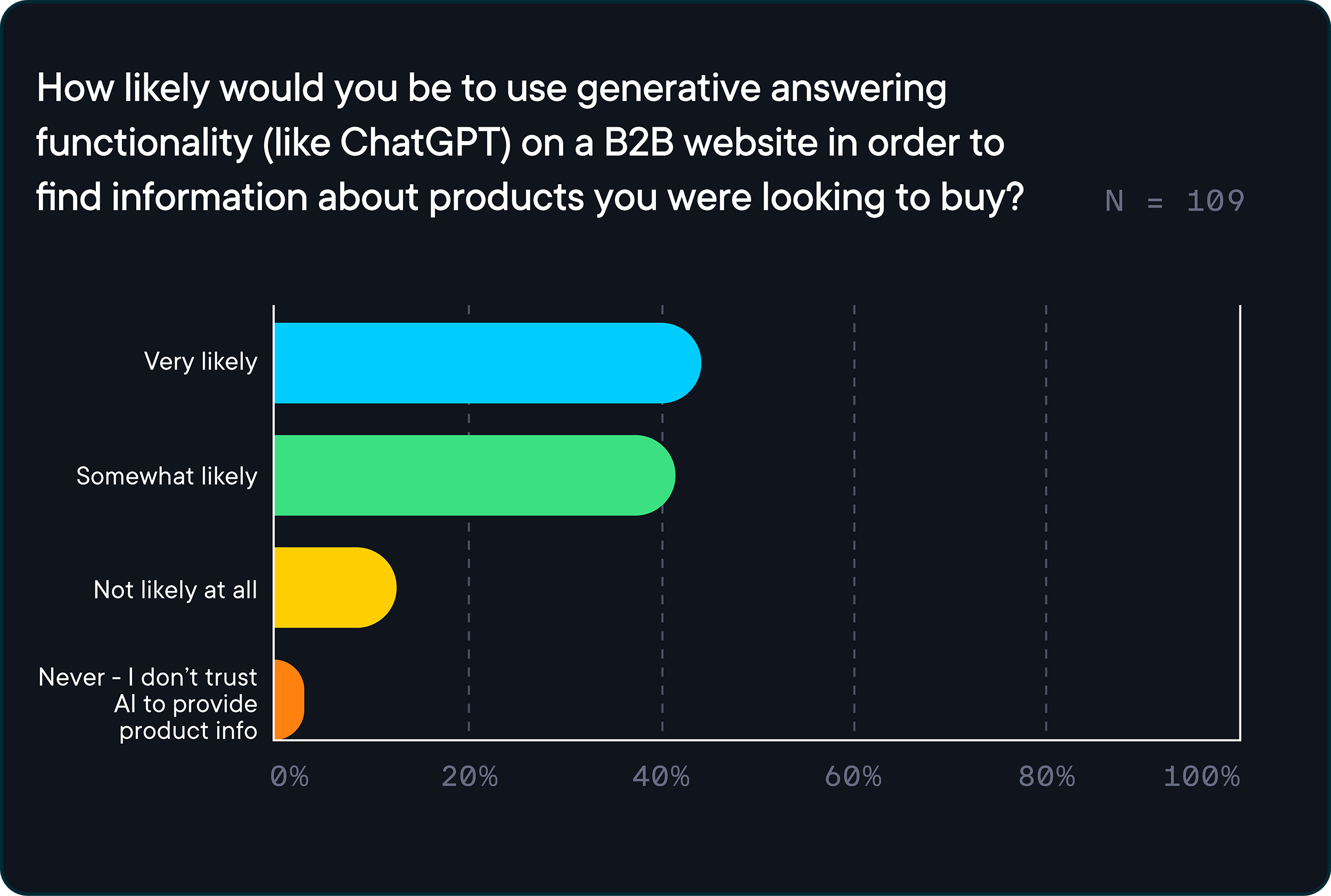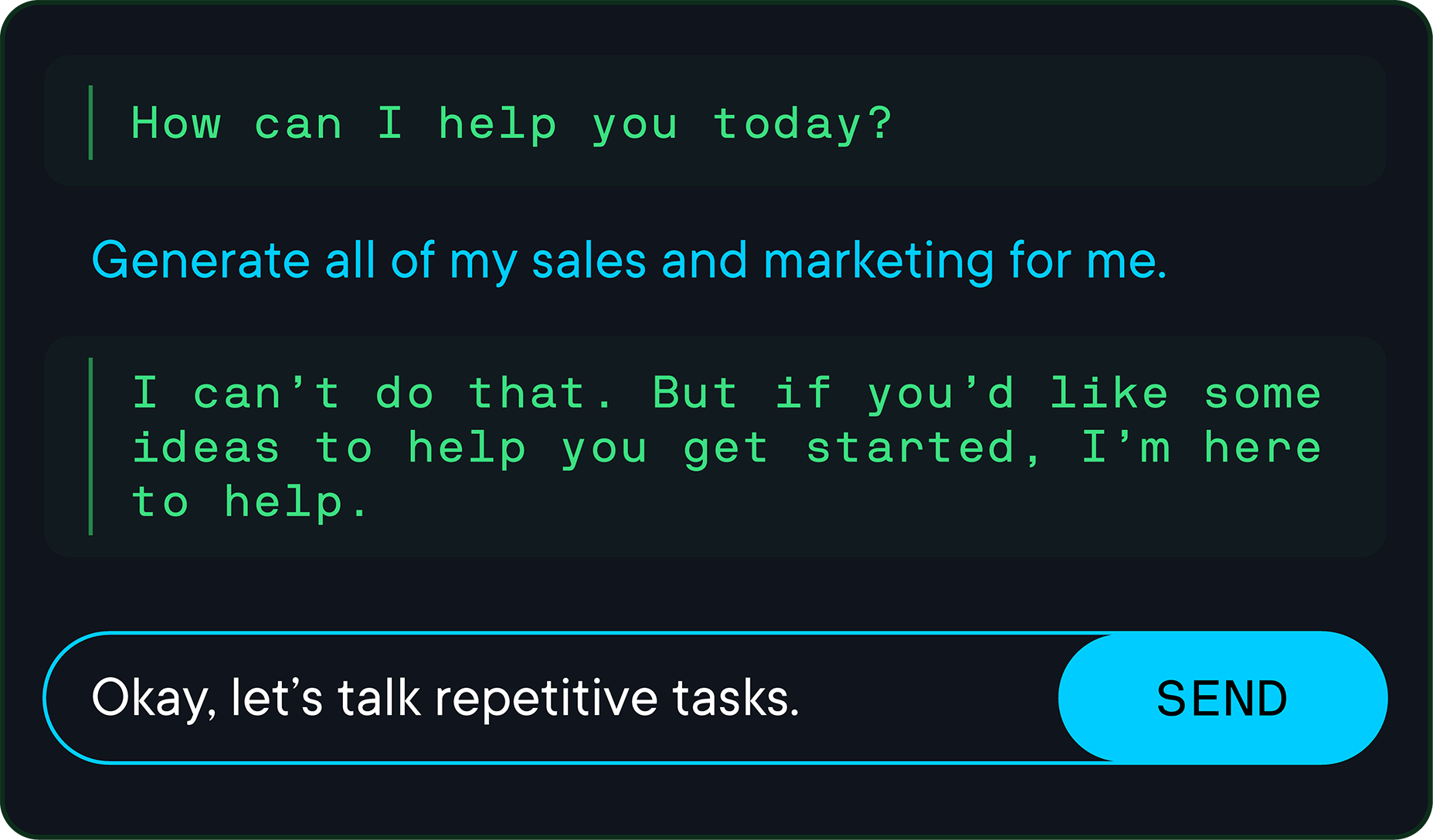Why 86% of B2B Buyers would use AI tools in the purchasing process
This blog offers advice for B2B e-commerce professionals on when and where to effectively use AI in their sales cycle. Get ready for actionable tips and insights!


Andy and Brian highlight in their 2024 State of B2B eCommerce report that B2B buyers are the epitome of efficiency. They often know exactly what they want and prefer the path of least resistance to make a purchase. To provide this frictionless experience, investing in AI for a smoother buying process is essential and will revolutionize B2B commerce in several impactful ways:
- Enhanced Customer Experience: AI tools can offer personalized recommendations and insights tailored to a buyer’s specific needs and past behaviors. This level of customization makes the sales process more efficient and satisfying for the customer, leading to higher loyalty.
- Increased Sales and Conversion Rates: By leveraging AI to analyze data and predict buyer behavior, businesses can fine-tune their sales strategies. AI can pinpoint the most promising leads and suggest optimal engagement times, ultimately boosting conversion rates and sales.
- Improved Operational Efficiency: AI can automate many aspects of the sales process, such as data collection and analysis. This reduces the time and effort required from sales teams, allowing them to focus on more strategic tasks and improving overall operational efficiency.
AI implementation strategies for B2B organizations

Can AI solve all your problems? The answer is complex! When it comes to implementing AI in business, it can be daunting to know where to begin and what investments will have the biggest payoff. You can either think of implementing AI narrowly or broadly across your organization.
- A narrow AI strategy focuses on applying AI to specific tasks or processes, such as automating customer service with chatbots or optimizing inventory management. This approach allows businesses to achieve quick wins and measurable improvements in targeted areas.
- On the other hand, a broad AI strategy aims to integrate AI across multiple facets of the organization, from marketing and sales to operations and HR. While this holistic approach can drive comprehensive transformation and innovation, it often requires significant investment and a longer timeline to see results.
Choosing between these strategies depends on a company’s goals, resources, and readiness to embrace AI-driven change. Analyzing your business for areas to apply AI narrowly is typically the recommended strategy for those just starting out in their AI transformation journey.
AI use cases for B2B digital marketers

In the above mentioned 2024 State of B2B eCommerce report by MasterB2B, a staggering 86% of respondents expressed their eagerness to use ‘ChatGPT-like’ tools on B2B websites for product research. AI can seamlessly integrate into the research process in a variety of way, offering a smooth and comprehensive experience.
- Product & Content Recommendations: By analyzing customer data and behavior, AI can suggest products and content that are most relevant to each buyer , enhancing the shopping experience and increasing the likelihood of purchase.
- Search: AI enhances search functionality by understanding natural language queries and providing more accurate and relevant search results, making it easier for customers to find what they need quickly.
- Quoting: AI can streamline the quoting process by automatically generating quotes based on customer specifications and historical data, reducing the time and effort required from sales teams.
- Chatbots: AI-driven chatbots can handle routine customer inquiries and provide instant support, freeing up human agents to tackle more complex issues and improving overall customer satisfaction.
- Content Creation: From keyword research and blog posts to whitepapers, leveraging generative AI in your content creation process can help you create the assets your customers need to make purchase decisions.
Upptäck varför Forrester utsett Optimizely till en ledare
Where AI currently sits

It’s tempting to think that ChatGPT and other generative AI tools can handle all your sales and marketing content needs. However, to quote MDM, AI is just a tool. It is not and never will be a replacement for your talented marketers, customer service agents, or sales team members. Your employees are the heart and soul of your business, building deep, long-lasting customer relationships and driving growth.
Look for opportunities where AI can scale, automate, and take over repetitive tasks. This allows your team to focus on areas where their emotional intelligence, thought leadership, and personal touch truly shine. Finding the right balance is key to leveraging AI effectively without losing the human element that makes your business unique.
AI in B2B e-commerce: building, not replacing, human connections
As we wrap up, it’s clear that AI is not just a buzzword but a transformative force in B2B e-commerce. From enhancing customer experiences to boosting sales and operational efficiency, AI offers a plethora of benefits. However, it’s essential to remember that AI is a tool to complement, not replace, the human touch that drives deep, lasting customer relationships.

